December 2020
Message from the Executive Director
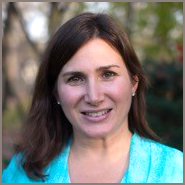 Dear NNPDF Friends and Family,
Dear NNPDF Friends and Family,
December brings a lot of reflection. A review of the year, it’s ups and downs, and a time to pause and reflect on hopes for the new year. The holiday season can be joyous and uplifting yet it is also sad, challenging, and overshadowed by loss for many families. Complex emotions and tangled experiences are all too common for families facing rare diseases. NNPDF is here to support you, as a partner on the Niemann-Pick journey. Our resources are available to all families and no one need feel alone.
In the new year we will continue to grow our Family Services programs, including our new Navigating Together support program (*registration required), weekly informal drop-in support sessions like Coffee & Catching Up (beginning again Monday, January 11th at 11am EST), programs for siblings, and our Emergency Hardship Program. We will continue to represent the patient voice in the regulatory process, working tirelessly to bring treatments for ASMD and NPC through the FDA approvals process. We will continue to advocate for newborn screenings for ASMD and NPC Niemann-Pick families, to advocate when legislation is needed, and to help families better understand the complexities of health insurance and entitlements. We will empower community members to advocate on behalf of themselves and all Niemann-Pick families, including on Capitol Hill during Rare Disease Week. We are working towards a future with FDA approved medical treatments and a diagnosis that comes with hope not fear.
Thank you for supporting us this year so that we can best support you.
Warm Wishes,

Joslyn Crowe, MSW, MA
NNPDF Executive Director
2020 Memorials
As 2020 comes to a close, we remember not only the families of those we’ve lost, but of those that remain. Please join the NNPDF in keeping all of our families in our thoughts now and throughout the year.
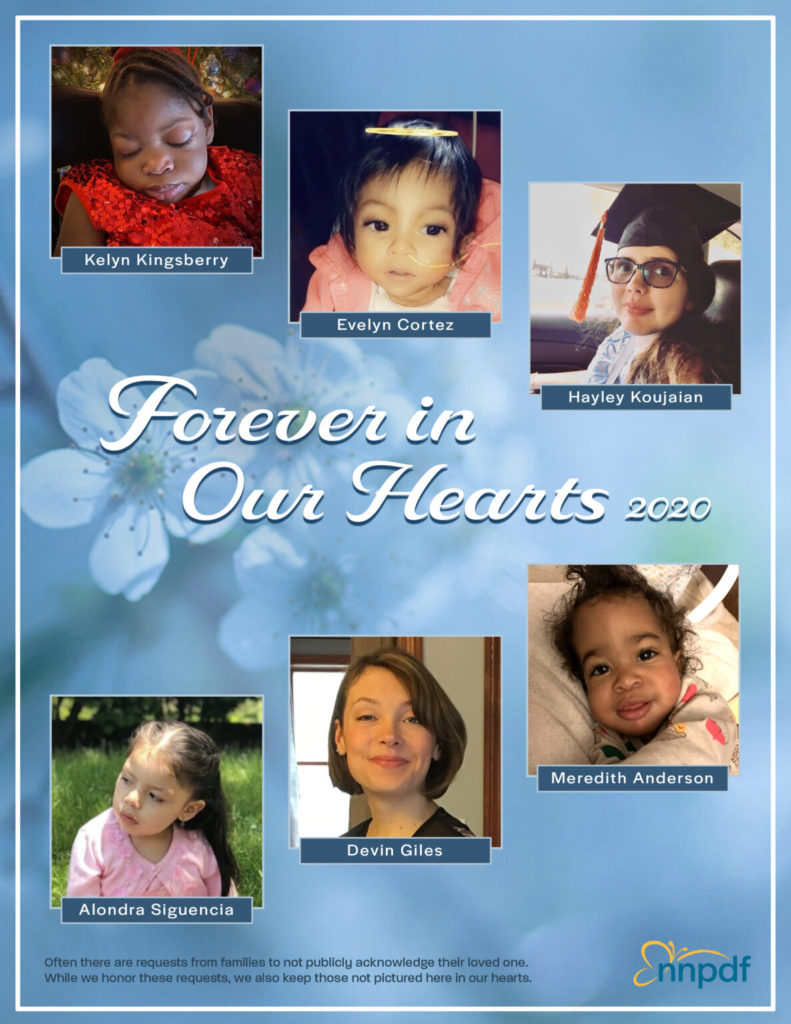
Grief Around the Holidays
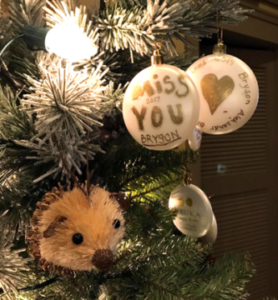 by Miranda Feinberg, NNPDF Intern
by Miranda Feinberg, NNPDF Intern
Happy occasions and special events are meant to be shared with loved ones and those we hold dear. When we lose a loved one, though, such events become hard to bear. Loss makes the moments that once represented positivity and happy memories warped and ruined. It’s not only normal, but completely expected to grieve harder around special occasions. As Serina Heinze, a member of our NNPDF community, says in her blog post The Grief Who Stole Christmas, “[the holidays are] just like a magnifying glass on the reminder that someone they love is gone.”
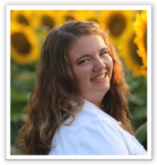 One way that Serina focuses on the way grief affects holidays or special occasions is how yearly traditions become disrupted or hollowed. What once might have been enjoyed every year and associated with specific holidays no longer feels special. The tradition is no longer the same; something is missing, someone is gone. Traditions and routines are so ingrained in our everyday lives, so when some part of them is changed and disrupted, the tradition itself becomes troublesome and harmful to our everyday lives. Furthermore, the special-ness of holidays and the magic that is tied to them can conflate the importance of traditions in a way that makes the loss of such traditions even more distressing. Serina uses Christmas as an example of a special occasion with many long-held traditions that can be irrevocably affected by loss. She describes how, after loss, the winter snow transformed from exciting and magical to gloomy and cold, how putting up the Christmas tree became a chore, and how holiday parties became something to be avoided rather than attended.
One way that Serina focuses on the way grief affects holidays or special occasions is how yearly traditions become disrupted or hollowed. What once might have been enjoyed every year and associated with specific holidays no longer feels special. The tradition is no longer the same; something is missing, someone is gone. Traditions and routines are so ingrained in our everyday lives, so when some part of them is changed and disrupted, the tradition itself becomes troublesome and harmful to our everyday lives. Furthermore, the special-ness of holidays and the magic that is tied to them can conflate the importance of traditions in a way that makes the loss of such traditions even more distressing. Serina uses Christmas as an example of a special occasion with many long-held traditions that can be irrevocably affected by loss. She describes how, after loss, the winter snow transformed from exciting and magical to gloomy and cold, how putting up the Christmas tree became a chore, and how holiday parties became something to be avoided rather than attended.
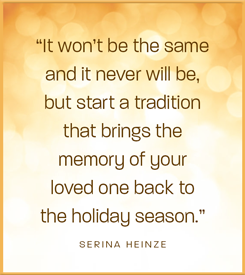 The loss of a loved one is felt deeply at those times where there was once so much happiness. The loss of that person becomes tied to the loss of those traditions. The simultaneous feelings of grief and sadness mixed with the knowledge that everyone around you is still enjoying those once-special holidays can be very upsetting. Serina acknowledges all of these negative holiday transformations that are born of loss, but she also shares ways that she has begun to move forward. One suggestion she has is to make new traditions. Holding onto the past, resolutely unable to move forward, can immortalize the pain and prevent any healing that could happen during those holidays. Serina suggests using new traditions as a way to remember and move forward; as she says, “it won’t be the same and it never will be, but start a tradition that brings the memory of your loved one back to the holiday season.”
The loss of a loved one is felt deeply at those times where there was once so much happiness. The loss of that person becomes tied to the loss of those traditions. The simultaneous feelings of grief and sadness mixed with the knowledge that everyone around you is still enjoying those once-special holidays can be very upsetting. Serina acknowledges all of these negative holiday transformations that are born of loss, but she also shares ways that she has begun to move forward. One suggestion she has is to make new traditions. Holding onto the past, resolutely unable to move forward, can immortalize the pain and prevent any healing that could happen during those holidays. Serina suggests using new traditions as a way to remember and move forward; as she says, “it won’t be the same and it never will be, but start a tradition that brings the memory of your loved one back to the holiday season.”
Moving forward is never about forgetting, but about creating something new. Serina suggests lighting a candle in honor of your loved one(s) or going around and sharing favorite memories about your lost loved one(s). Maybe you can make your loved one’s favorite meal or do something that they particularly liked. Creating some new tangible tradition is a good way to express the idea that even though your loved one is gone, the love you feel for them will always remain. It also helps to plan ahead and stay in control when you are approaching an event that you know will be painful. Remember that while it is important to allow yourself to feel and to grieve, it might be healthy to set boundaries for yourself and familiarize yourself with what is harmful and what is helpful to experience. If certain traditions are too painful to bear or certain events are too hard to attend, then don’t force yourself to experience them. Spend time with the people around you and focus on the positives wherever they are.
Coffee & Catching Up
 JOIN US for Community Connections Coffee & Catching Up on Monday mornings at 11am EST! Connect with other Niemann-Pick community members who share your journey. Click here to register.
JOIN US for Community Connections Coffee & Catching Up on Monday mornings at 11am EST! Connect with other Niemann-Pick community members who share your journey. Click here to register.
If you have any questions please contact Laurie Turner, Family Services Manager at [email protected] or 603-413-8707.
Newborn Screening
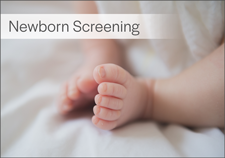 By Pam Crowley Andrews, Executive Director, Firefly Fund and Allison Rosen, 3D Communications for Firefly Fund
By Pam Crowley Andrews, Executive Director, Firefly Fund and Allison Rosen, 3D Communications for Firefly Fund
What a Year: 2020 Review for NPC Newborn Screening Initiative
In some ways it’s hard to believe we’re about to turn the page to 2021. In others, it’s surprising we’re not about to enter 2022. COVID-19 has laid a heavy burden across the world. Certainly, the NPC community was not immune. Despite all of the challenges brought about by the pandemic, Firefly Fund’s Newborn Screening Initiative completed a productive year – and we are excited about what is in store for the new one.
First, with the generous support of our many sponsors and funders, we were able to commit $500,000 to support the novel ScreenPlus newborn screening pilot study that expects to screen its first neonate in early 2021. Dr. Melissa Wasserstein and her team at Montefiore have worked tirelessly – amidst the spread of the coronavirus – to finalize details for the study which includes NPC among disorders that parents will have the option to screen for at birth. Eight high birth rate hospitals in New York are initially on board and it’s expected to screen about 175,000 newborns over 5 years.
We also were able to design and launch a truly innovative study with AllStripes that will – using patient health records – research the impact of earlier intervention in NPC. The study will compare health outcomes of siblings with NPC, looking at possible differential outcomes based on timing of intervention, where one child may be diagnosed following onset of symptoms that triggers the diagnosis of another child who is diagnosed before the onset of visible symptoms. If you are a parent with multiple children affected by NPC, or know someone who is, please look into participating in this critical research by visiting allstripes.com/npc.
Finally, while we of course would have much preferred to meet face-to-face, we held our second annual Clinical Roundtable – but our first virtual one! Twenty experts (along with more than 20 community and industry supporters) convened on a Zoom meeting to review new information and discuss questions to help align expert opinion on the timing for intervention for NPC when a child is diagnosed in a newborn screening context. Co-chairs Drs. Elizabeth Berry-Kravis and Marc Patterson asked the experts a series of questions including, whether treatment modality matter to timing of intervention; should patients experience a certain change in rate of developmental decline before initiating treatment; and How do we monitor developmental change and neurological function? We are compiling comprehensive notes from the meeting and will be sharing with the full team in early 2021.
The NPC Newborn Screening Initiative is a program of the Firefly Fund. NNPDF is proud to support this initiative as an active Working Group member.
Congratulations to our NNPDF Community Game Winners!
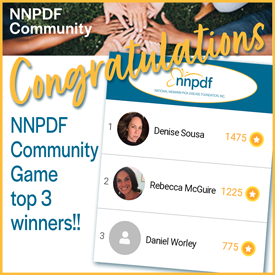 Congratulations to Denise Sousa, Becky McGuire, and Daniel Worley, our top 3 winners! Thank you to all who participated.
Congratulations to Denise Sousa, Becky McGuire, and Daniel Worley, our top 3 winners! Thank you to all who participated.
The NNPDF Community section of the app keeps you connected to NNPDF friends and families, and up-to-date on our latest news, updates, and programs throughout the year. The NNPDF Community Mobile App is available through the App Store and on Google Play.
In the Spotlight
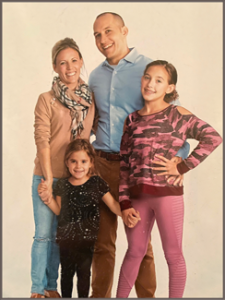 Kaila Guy, ASMD
Kaila Guy, ASMD
Tell us a bit about yourself, such as where do you live and what do you enjoy doing.
My wife, Jennifer, and I (David) both grew up in Massachusetts and up until a month ago lived in Brookline, MA (right next to Boston). We have recently relocated to Sarasota, FL to enjoy a warm winter, while my office in Boston is closed. I’m the Chief Compliance Officer for Devonshire Investors, a private equity and venture capital firm, and Jennifer is a ballet teacher. We have two girls Kaila, 13 (with ASMD) and Collette, 7.
My wife hoped to have little ballerina’s, but my girls turned in the ballet slippers for gymnastics. Both girls compete competitively, and we spend most our week shuttling our girls back and forth to gymnastics. Seeing Kaila excel at gymnastics and her little sister try to keep up is what I enjoy most.
When did you receive your diagnosis? What led you to diagnosis?
Kaila received her diagnosis at the age of 5. Her stomach was noticeably distended starting at age two-three, but her pediatrician told us it was baby fat and she would grow out of it. At age 5, my wife brought my daughter in for a checkup for an ear infection, and the doctor on call started feeling her stomach and thought she felt Kaila’s spleen and liver.
For about 4 months doctors at Boston Children Hospital tested Kaila just about every week for everything they could imagine. They originally thought she had leukemia, then diagnosed her with children’s mono, and then thought she had leukemia again. Kaila’s spleen and liver were extremely large, and her cholesterol and triglyceride levels hovered between 400-500 mg/DL.
Researching Kaila’s symptoms on the internet, my wife and I came across Niemann-Pick disease on a website. The symptoms matched our daughter’s symptoms and we asked the doctors to test for the disease. At the same time, we had our genetics tested. Three weeks later the doctor’s told us they thought Kaila had Niemann-Pick Type B (A was ruled out because she was alive) and she was the first case in the hospital’s history. The doctors literally handed us a piece of paper with numbers to call and stated they were not sure of the next steps. Immediately after we received the diagnosis, the genetics organization called telling my wife she carried the Niemann-Pick Type B gene and I carried the Niemann-Pick Type A gene.
What were the first steps you took after diagnosis?
We called the numbers on the piece of paper. One was a number to an individual who was affiliated with the hospital and worked at Genzyme. He had co-authored a few papers on Niemann-Pick Type B. The other number we called was the number to the NNPDF.
Genzyme almost immediately invited us into their office, as Kaila was the first known case in Massachusetts, and we lived a few miles from the office. Genzyme provided us a background on the disease and their hope for a treatment.
How did you learn about NNPDF?
The doctors at the hospital provided us the director of the NNPDF’s phone number. We spoke with the NNPDF director for about an hour and also joined the Facebook page.
What caused you to get involved with NNPDF initially and how has being an NNPDF member benefitted your family?
We really wanted to push hard for a treatment and the thought the best path forward was through the foundation. Additionally, the foundation gave us an opportunity to meet other families and help other families, where possible, as much as we possibly could.
Further, the NNPDF has provided us an opportunity to speak with the FDA in-person to express the need for a treatment. I think that conversation and providing our experience with ASMD will hopefully go a long way in getting the treatment across the finish line.
What impact has ASMD had on your life?
I think it brought us closer as a family. Definitely ended up spending a lot of nights together traveling and staying in crammed New York City hotel rooms. It also expanded our family, as we adopted a cat near Mt. Sinai hospital.
Additionally, we found an incredible support group of other families, who have become like family members. It has been a wild ride, but I think there is a lot of hope for the future.
What are your hopes for the future for yourself and for the Niemann-Pick community?
Our hope is for everyone in the world to have access to the treatment. Since Kaila began the clinical trial almost 5 years ago, she has transformed into an incredible kid and gymnast. We are keeping our fingers crossed that 2021 will be an amazing year with an FDA approved treatment.
What Does NNPDF Mean to You?
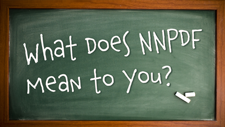 We are looking for your help! Connecting with others by sharing YOUR story is how our community can support one another. Will you share your story on what NNPDF means to you? These stories will be included in our upcoming newsletters, shared on our social pages and with some of our partners. Send your stories, along with a photo to [email protected].
We are looking for your help! Connecting with others by sharing YOUR story is how our community can support one another. Will you share your story on what NNPDF means to you? These stories will be included in our upcoming newsletters, shared on our social pages and with some of our partners. Send your stories, along with a photo to [email protected].
Pfrieger’s Digest
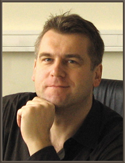 “Pfrieger’s Digest” is written by Frank Pfrieger of Niemann-Pick Selbsthiifegruppe (Germany) to provide an overview of the latest advances in Niemann-Pick disease based on recent scientific publications.
“Pfrieger’s Digest” is written by Frank Pfrieger of Niemann-Pick Selbsthiifegruppe (Germany) to provide an overview of the latest advances in Niemann-Pick disease based on recent scientific publications.
Frank Pfrieger is group leader at the Institute of Cellular and Integrative Neurosciences in Strasbourg (France), which is part of the French Centre National de la Recherche Scientifique (CNRS) and affiliated with the University of Strasbourg. His research focuses on cholesterol metabolism in the brain and the mechanisms of neurodegeneration in Niemann-Pick type C disease.
Frank entered the field of Niemann-Pick type C disease 17 years ago. His previous research had raised fundamental questions about how cells in the brain meet their need for cholesterol, and defects in NPC1 appeared as a good model to test our hypotheses. Over time, he met patients, their parents and friends, and he realized the need to explain what research is all about, why it takes so long and what it takes to make progress. For several years, Frank wrote conference reports for the German NPC association. Beginning of 2020, he created “Pfrieger’s Digest”, a sort of “magazine” that informs non-specialists about the latest advances in the field based on scientific publications.
Pfrieger’s Digest – Issue 01/2020
Pfrieger’s Digest – Issue 02/2020
Pfrieger’s Digest – Issue 03/2020
Family Journeys Blog
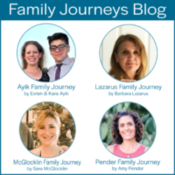 The Family Journeys Blog posts have been updated for the month of November. Follow our 4 NNPDF families from across the country as their share monthly updates to bring some light and positivity to our community! Our blogger families share personal, uplifting, hopeful stories to show what it means to be living with Niemann-Pick disease. Check out the blog!
The Family Journeys Blog posts have been updated for the month of November. Follow our 4 NNPDF families from across the country as their share monthly updates to bring some light and positivity to our community! Our blogger families share personal, uplifting, hopeful stories to show what it means to be living with Niemann-Pick disease. Check out the blog!
Illustrate Your Imagination
 HEY SUPERHEROES!
HEY SUPERHEROES!
In recognition of Global Niemann-Pick disease Awareness Month, the Orphazyme team invites you to join us on a quest to “Illustrate Your Imagination.”
Our team often hears brave stories of your experiences living with Niemann-Pick disease and times when you took on challenges with deep personal courage, perseverance, care, and integrity. We’d like to help your super stories take flight.
Your mission, should you choose to accept it: Visit IllustrateYourImagination.com and download a kit to create your own comic. The kit is filled with page templates, instructions, and some flair to help bring your story to life. Submit your story to our online comic book gallery and check out submissions from other superheroes around the world.
We can’t wait to see the creative stories you come up with!
Regan Sherman
Head of Global Patient Advocacy Relations
Orphazyme
Clinical Trial Updates
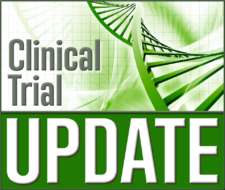 Clinical trials are currently in progress to study and develop treatments for ASMD and NPC. The NNPDF posts new information regarding clinical trial updates as soon as it is received. Visit our Clinical Trials web page for up to date information on all clinical trials.
Clinical trials are currently in progress to study and develop treatments for ASMD and NPC. The NNPDF posts new information regarding clinical trial updates as soon as it is received. Visit our Clinical Trials web page for up to date information on all clinical trials.
Update from Orphazyme: Orphazyme provides regulatory update on arimoclomol for Niemann-Pick disease type C. Click here for complete announcement.
Community News Updates
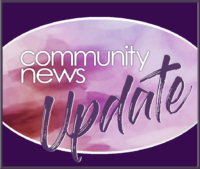 Cyclo Therapeutics announces pricing of $12.5 million public offering. Click here for complete announcement.
Cyclo Therapeutics announces pricing of $12.5 million public offering. Click here for complete announcement.
Orphazyme has shared a statement for the NPC Community regarding the resignation of CEO Kim Stratton. Click here to read complete statement.
Emergency Hardship Program
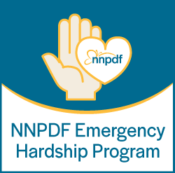 The NNPDF Emergency Hardship Program offers help to qualified NNPDF U.S. member families facing a crisis. Funding includes but is not limited to, specialized medical equipment, durable medical goods, utility bills (heating and cooling, electricity, phone, water and sewer), home and car repairs, and bereavement expenses. This assistance program provides relief to members facing a situation that threatens their immediate health and safety, or that causes a terrible hardship. It is intended to provide short term financial assistance in a crisis situation and is not intended to address long term financial challenges.
The NNPDF Emergency Hardship Program offers help to qualified NNPDF U.S. member families facing a crisis. Funding includes but is not limited to, specialized medical equipment, durable medical goods, utility bills (heating and cooling, electricity, phone, water and sewer), home and car repairs, and bereavement expenses. This assistance program provides relief to members facing a situation that threatens their immediate health and safety, or that causes a terrible hardship. It is intended to provide short term financial assistance in a crisis situation and is not intended to address long term financial challenges.
If you have questions about this program, please contact Laurie Turner, Family Services Manager at 603-413-8707 or [email protected]. Applications will be reviewed by the NNPDF Emergency Hardship Program Committee consisting of 2 Board members and 3 members-at-large.
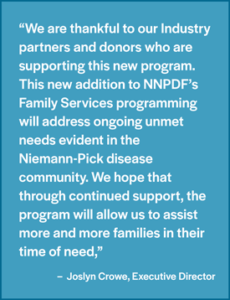 To be eligible for funding, NPD individuals and families must reside in the US and must be enrolled as a member of the NNPDF for a minimum of 6 months prior to requests*. Funding is available for up to $1000 per calendar year per eligible member. Families with multiple children with NPD are eligible to apply for each affected individual. The NNPDF Board of Directors and Emergency Hardship Program Committee members work to keep the fund fiscally sound, by being the last resort to be used, limiting regular, recurring use by any one recipient, and encouraging donations.
To be eligible for funding, NPD individuals and families must reside in the US and must be enrolled as a member of the NNPDF for a minimum of 6 months prior to requests*. Funding is available for up to $1000 per calendar year per eligible member. Families with multiple children with NPD are eligible to apply for each affected individual. The NNPDF Board of Directors and Emergency Hardship Program Committee members work to keep the fund fiscally sound, by being the last resort to be used, limiting regular, recurring use by any one recipient, and encouraging donations.
Stay Connected With Us
A quick reminder that if you are not receiving our NNPDF monthly newsletter via email or have recently changed your address or email, please click here to join us or to update your information.
